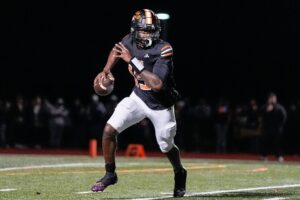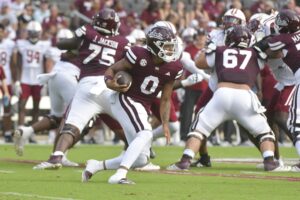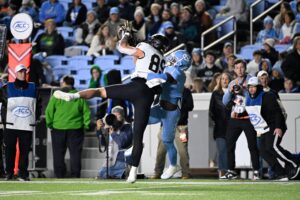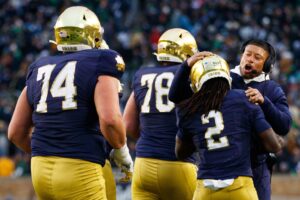The first eight Dawgs have already been knocked off the list. Now, it is time to take a look at the eight best Dawgs in the College Football Hall of Fame. These eight men were on a whole different level than 99% of players that have walked under The Arch on campus in Athens before they made their way to the CFB Hall of Fame.
Dawgs In CFB Hall Of Fame; Part 2
8. Jake Scott – Safety
Inducted in 2011, Scott only got to play for the Dawgs for two seasons in 1967 and 1968. His freshman season was wiped out by injury. He would bypass his senior season to go pro. Even with just two seasons, Scott was able to set the all-time career interception record at Georgia at 16 and the all-time career record to interception return yards at 315, which he still holds to this day. During his final season, Scott was a consensus All-American. Dooley would go on to say that Scott was the best player he had ever coached. Following his junior season, Scott went to the CFL for one season before heading to the NFL where he would win two Super Bowls and a Super Bowl MVP.
7. Wally Butts – Coach
The first coach on our list, Wally Butts served as Georgia’s head man from 1939-1960. Before his time coaching at Georgia, he had coached various high school teams over the course of 10 years, losing just ten games. Then, in 1938 he was hired as Georgia’s assistant coach and promoted the following season. Butts would put up a record of 140 wins, 86 losses, and 9 ties. His 1942 team was considered by some outlets to be the National Champions. Butts coached some of the best Dawgs of all time, including Frank Sinkwich, Charlie Trippi, and John Rauch. Following his time as head coach, Butts spent four years as the school’s athletic director. The main athletics building on campus dons his name.
6. Kevin Butler – Kicker
Inducted in 2001, Butler served as Georgia’s place kicker from 1981-1984. In 1984, he was a consensus All-American. Butler still sits in the top 10 in SEC history in field goals attempted and field goals made. He is 16th in SEC history in points scored. His 2001 induction made him the first place kicker to enter the College Football Hall of Fame and followed being named to Sports Illustrated’s All-Century team, ABC’s All-Time team, and the Walter Camp Foundation’s All-Century team. Butler had four kicks longer than fifty yards in his college career, including a 60-yarder. During the 1984 Citrus Bowl, Butler attempted a 71 yard field goal, but came up just a couple of yards short. Following his time in Athens, Butler spent 1985-1997 as an NFL kicker.
5. Terry Hoage – Safety
Hoage came to Athens in 1980 and would spend four seasons at Georgia. He would be inducted into the Hall of Fame in 2000. From the time he was a freshman, Hoage was making an impact for the Bulldogs. In the 1981 Sugar Bowl, Hoage blocked a field goal in a game that Georgia ultimately won by just a touchdown. Hoage’s NCAA-leading twelve interceptions in 1982 is still a school record. He would end up as a two-time consensus All-American, two-time Academic All-American, and two-time SEC Defensive Player of the Year. Following his senior season, Hoage finished fifth in Heisman voting, the highest finish for a defensive player up to that point. He would go on to have a long career in the NFL, playing for thirteen seasons with five different teams.
4. Charley Trippi – Running Back
Trippi spent three seasons at Georgia, joining the team in 1942. His career took a pause with World War II. But Trippi returned to football and played in 1945 and 1946, as well. During that debut sophomore season, Trippi was backing up fellow Hall of Famer Frank Sinkwich. Sinkwich would suffer two sprained ankles heading into that season’s Rose Bowl, and Trippi would get his first start. The Bulldogs were able to win the game and the National Championship. During his service, he played on Third Air Force Gremlins football team and was drafted by the Cardinals.
After the war, Trippi made an agreement with Cardinals’ owner, Charles Bidwell, and was able to return to Athens to continue to roll through defenses. He would go on to become a unanimous All-American, SEC Player of the Year, Maxwell Award winner, and Heisman runner-up. He sits seventh on the career rushing touchdown list for Georgia and his 239 yards against Florida in 1945 is fifth most in a single game for a Dawgs running back.
3. Frank Sinkwich – Running Back
The first of the truly big three icons of Georgia football, Sinkwich played for the Georgia from 1940-1942 and was inducted in 1954. Sinkwich was a truly special player, being able to both run the ball and make accurate passes to open receivers. He was a two-time consensus All-American, a National Champion, Sporting News Player of the Year, AP Athlete of the Year, and UGA’s first of two Heisman winners. In his final season, Sinkwich shared the backfield with Charley Trippi and the duo were able to pick up a 75-0 win over Florida. The year prior, he played with a broken jaw against the Gators. Sinkwich still sits fifth on Georgia’s career total touchdowns list, tenth in Georgia’s career passing touchdown leaders, and eighth on the school’s career rushing touchdown list.
When he left Georgia, he held the NCAA record for career total yards and career rushing yards before later being eclipsed in both categories. He would go on to be selected first overall by the Lions, playing seven seasons in the league and winning an MVP along the way. Outside of football, Sinkwich served in the Merchant Marines and Air Force during a hiatus from his pro career.
2. Vince Dooley – Head Coach
The most legendary coach in Georgia Bulldogs’ history, Vince Dooley led the team from 1964-1988. He was inducted into the Hall of Fame in 1994. During his time as a head coach, Dooley racked up 201 wins, 77 losses, and 10 ties. The coach led the Bulldogs to six SEC Championships and, of course, the 1980 National Championship. Dooley won numerous coach of the year awards over the years, including four during that legendary 1980 season. He coached some of the best players that ever donned the red and silver, including Herschel Walker, Terry Hoage, and Scott Woerner.
In 1979, Dooley took over as the school’s athletic director and would maintain that position through 2004, even after he retired from coaching. As AD, Dooley hired some of the more iconic coaching names during this most modern era of Georgia football, including Jim Donnan, Ray Goff, and Mark Richt. In 2019, the football field inside of Sanford Stadium was renamed to Dooley Field to honor the coach.
1. Herschel Walker – Running Back
The one and only Herschel Walker played for the Georgia Bulldogs from 1980-1982. He was inducted into the Hall of Fame in 1999. Walker is one of the most recognizable names when it comes to college football history. In just three years, he ripped the record books apart and won a National Championship in the process. To go with his title, Walker also won a Heisman, the Maxwell Award, the Walter Camp Award, three SEC Player of the Years, three consensus All-American recognitions, and three All-SEC recognitions. Walker was also named the second best college player of all time on the CFB150 list to commemorate 150 years of college football.
Upon leaving after his junior season, Walker held forty-one school records, sixteen SEC records, and eleven NCAA records. If he had stayed for a fourth year and continued at the same pace, he would have rushed for over 7,000 yards, 600 yards more than the record held by Donnel Pumphrey. He still holds the SEC records for career rushing attempts, career rushing yards, and career yards from scrimmage. Walker would go on to play three seasons in the USFL and twelve in the NFL. Walker is without a doubt the greatest player to ever step foot “Between the Hedges” and could have likely held even more records to this day had he decided to stay all four years.
And there you have it. The eight best Dawgs in the College Football Hall of Fame. The two part list just goes to show the star power and talent that has come through Athens, Georgia.






